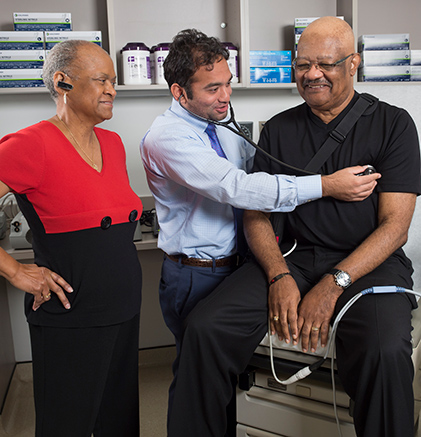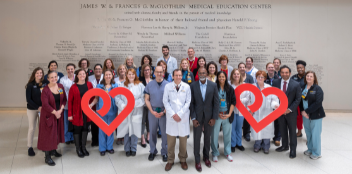Doctors Explore Devices in Clinical Trials

VCU Health Pauley Heart Center doctors are exploring a new generation of mechanical assist devices that may improve quality of life for heart failure patients.
Two new trials involve left ventricular assist devices. An LVAD is “a pump that is implanted into the left ventricle. It decompresses the heart by ejecting blood in parallel fashion to the aorta,” says Keyur Shah, M.D., medical director of Mechanical Circulatory Support.
Shah and Vigneshwar Kasirajan, M.D., chief of Surgery, are investigators on the MOMENTUM 3 Clinical Trial, which started this summer, and is comparing an older model LVAD to the HeartMate III, a new, smaller, continuous-flow LVAD that is magnetically levitated.
“It’s hypothesized to have lower clotting and bleeding risks than the currently approved device,” says Shah. “We are currently enrolling patients with symptomatic heart failure who are not responding well to medical therapy.”
Daniel Tang, M.D., surgical director of Mechanical Circulatory Support, is Principal Investigator (PI) of the LATERAL trial, which is exploring a new, minimally invasive method of implantation for the HVAD pump. In the trial, the HVAD is inserted through an incision in the side of a chest wall rather than through the middle of the chest. The trial, which began in June, is also exploring whether this technique will reduce complications and time in the ICU, and ultimately may determine if the minimally invasive approach should become the standard of care in the future.
Tang is also the PI of two clinical trials that began this summer that look at the total artificial heart (TAH), a pump that replaces the entire heart. Currently, the TAH is only approved for use with dying patients who are awaiting heart transplantation. The first trial is exploring also using the device for the purpose of destination therapy. That is, making the total artificial heart available to patients who are not candidates for transplant but who will choose to have the pump implanted and live out their lives with it. This is the first time the pump is being evaluated for use in these patients.
The second trial looks at a new artificial heart that is much more compact and intended for use in smaller patients, including women and children. Many of these patients have chest cavities that are too small for the other models.
Finally, the COUNTER HF study that began in 2014 is exploring the new mechanical technology of extra-aortic counter pulsation. “This is a device called the ‘C-pulse,’ and it wraps around the aorta and functions like an intra-aortic balloon pump, providing counter pulsation to the heart. It improves cardiac function and symptoms of heart failure,” says Shah. “It’s for patients that are symptomatic but are not sick enough to be eligible for an LVAD or a total artificial heart.”
As devices are explored and refined, he is optimistic about the future. “I think we’re in an age where technological advancements are going to lead to reduced complications with these devices and improve survival and quality of life.”
Did you know?
VCU Health Pauley Heart Center doctors have implanted about 300 LVADs to date.
TOP: MEDICAL DIRECTOR OF MECHANICAL CIRCULATORY SUPPORT DR. KEYUR SHAH VISITS WITH A PATIENT AT VCU HEALTH PAULEY HEART CENTER.
Back to Autumn-2015
Join our Pauley Consortium composed of patients, friends and advocates.

